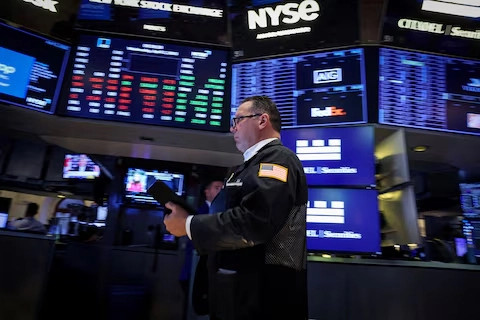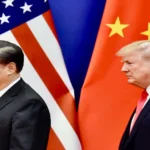Global Trade War Fears Rock Financial Markets: Financial markets are in turmoil due to rising global trade war fears. President Donald Trump’s new tariffs have triggered panic among investors. Wall Street’s fear gauge hit a five-year high. Business leaders worry about slowing economic growth.
Stocks dropped sharply as trade tensions escalated. The uncertainty has spread across global markets. Analysts warn of long-term damage if the conflict worsens.
Also Read | Massive Anti-Trump Protests Erupt Across the US: Thousands Demand Change
Global Trade War Fears Rock Financial Markets: Insights
- Global trade war fears are shaking stock markets as investors brace for economic turbulence.
- Investors fear higher costs from tariffs will hurt profits.
- Stock markets in the US, Europe, and Asia saw heavy losses.
- Business leaders warn of supply chain disruptions.
- The US-China trade dispute remains a major risk factor.
- Economists predict slower global growth if tensions continue.
Background
Trade tensions have been rising for months. The US imposed tariffs on steel and aluminum imports earlier this year. China and the EU retaliated with their tariffs. The conflict escalated as the US threatened more taxes on Chinese goods. Past trade wars have led to economic slowdowns.
Experts say prolonged disputes could harm jobs and consumer prices. Businesses worldwide are cutting costs due to rising global trade war fears and tariff threats.
Main Event
Financial markets plunged as trade war fears grew. The Dow Jones fell over 500 points in a single day. The CBOE Volatility Index (VIX), known as the “fear gauge,” surged to its highest since 2013. Major companies, including Apple and Boeing, saw big stock drops.
Top economists warned of serious risks. JP Morgan’s CEO called the situation “dangerous.” The IMF said trade wars could cut global growth by 0.5%. China threatened to hit US agriculture exports. Analysts warn that global trade war fears could slow growth and raise consumer prices.
Meanwhile, the White House defended the tariffs. Officials argued they protect American jobs. However, many industries, like auto and tech, fear higher costs. Investors now wait to see if negotiations ease tensions.

On the NYSE trading floor, a broker actively handles transactions.
Photo Credits: REUTERS.
Also Read | Trump’s Trade War Impact on China and U.S. Manufacturers
Implications
Consumers may face higher prices on imported goods. Businesses relying on global supply chains could suffer. Farmers and manufacturers fear losing key export markets. Stock market losses may reduce retirement savings.
Governments may struggle to boost growth if trade slows. Governments face pressure to negotiate before global trade war fears trigger a full-blown crisis.
Conclusion
The global economy faces uncertainty as trade tensions rise. If talks fail, markets could see more turmoil. Experts urge diplomacy to avoid long-term damage. Investors should prepare for volatility ahead. The next few weeks will be critical.
You May Also Check |
- Trump’s “Liberation Day” Tariffs: How New Trade Taxes Could Shake the Global Economy
- Trump’s Bold 25% Car Import Tariff: What It Means for the Auto Industry and Consumers
- How Trump’s Auto Tariffs Could Hurt His Working-Class Supporters
- Macron US Tariffs Dispute: France Calls for Investment Freeze – What’s Next?
- iPhone Price Increase Due to Tariffs Could Push iPhone 16 Pro Max to $2,300
- Trump Considers 20% Import Tariffs Amid Global Trade War Fears



